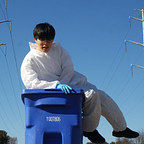Within the next few days, the 23-ton core stage of China’s Long March 5B rocket will be landing back on Earth. The reason this has become a big deal is due to the nature of the landing. No one, including the Chinese government which launched the rocket, knows where it will land. That means that while it’ll most likely land in the ocean or an uninhabited area, it’s very possible that urban centers in a certain range, including New York and DC, are candidates for a very large and very dangerous new gift.
And this is where the entire problem with space debris comes into play. There’s just too much of it. While space might be large, the Low-Earth Orbit where most satellites reside is finite. And within that range, there are already over half a million pieces of space debris. Only a fraction (about 21,000) are larger than 10 cm wide, but even the smaller pieces could cause costly damages. At speeds of up to 18,000 miles per hour, even a chunk less than 2 cm in diameter can functionally destroy a satellite. A 23-ton piece of debris might be getting all the attention, but it’s really all the little pieces that we have to be aware of.
So what is space debris? It’s any man-made material let off into space without control. This includes broken-off pieces from space crafts (which is why it’s highly unadvised to blow up satellites when they’re decommissioned, since that creates thousands of tinier debris), as well as objects unintentionally released into space (for example, astronaut Piers Seller let a spatula loose while outside the ISS), among other things.
Larger chunks of space debris are able to be tracked, and oftentimes if a piece of space debris is nearing a satellite, the country which owns it will be notified. However, most actions come at a voluntary basis by a country and their own laws. This is why China was allowed to let their rocket core go loose, instead of giving it the capability to return to a specific site.
While there are some international agreements made from the 1960s and 70s (ex. The Outer Space Treaty of 1967 by the UN,) they all deal in very general terms, and in addition to being outdated, they are most importantly not enforced. This leaves us with no clear solution for space debris, and as more and more satellites enter Low-Earth orbit and older ones get decommissioned, the problem is only worsening.
So what do we do? If any international law is to be practical, the UN has to update their laws to match with the times (this issue is also crucial with the commercialization of space through companies like SpaceX, a concept likely unimaginable in the 1960s,) and have more enforcement for said laws. Within countries themselves, having strict laws will also be necessary to mitigate space debris. Within the US, the Space Force, often considered a less than serious organization (their members are called “Guardians”), will have to create some actual policies and influence so that companies don’t become the only driving force in the new space market.
As for the 23-ton core? We’ll just have to wait and see. Chances of real destruction are low, and it’s unlikely that it’ll be on the public’s conscious for long. But in order to bring space debris into the mainstream, we have to use any chance we get. Inaction will only lead to more problems, and this moment in time can potentially have massive reverberations in actual space policy.
Thanks to Mr. Stephen McCall and Dr. James S.J. Schwartz for their clarification on this topic. I had already started a research project into space ethics, and this was just a chance to provide more clarification with what I’ve learned! More articles on space, especially space ethics, soon!
— Jake
Chang, K., & Myers, S. L. (2021, May 8). A Chinese Rocket Is Tumbling Back to Earth. Where Will It Land? Retrieved May 08, 2021, from https://www.nytimes.com/2021/05/08/science/china-rocket-reentry-falling-long-march-5b.html
Fernholz, T. (2018, June 29). What happens when astronauts drop their tools in space. Retrieved May 08, 2021, from https://qz.com/1318450/a-recent-history-of-nasa-astronauts-dropping-things-from-the-space-station/
Paoletta, R. (2021, May 5). This is what legally happens if an uncontrolled rocket damages… Retrieved May 09, 2021, from https://www.planetary.org/articles/uncontrolled-reentry-rocket-damage-space-lawyers-explain
Recognising sustainable behaviour. (2019, May 6). Retrieved from http://www.esa.int/Safety_Security/Space_Debris/Recognising_sustainable_behaviour
